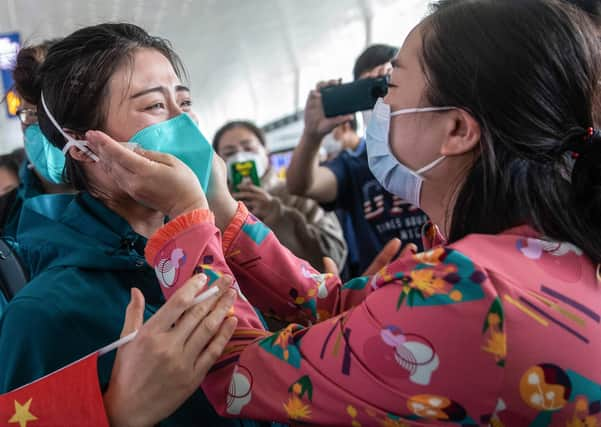Beware a global reckoning after coronavirus pandemic – Bill Jamieson


Look on those mountainous graphs and despair: rising deaths, extended lockdown, soaring unemployment and government debt. Then peer at the abyss: an economic slump worse than the Great Depression and the loss of businesses and livelihoods. The nightly news has become an elongated trail of misery, gloom and apprehension, rounded off with that grimmest of reminders: the peak has yet to come.
A lurch to protectionism and trade wars may be the least of it. For the UK alone, the forecasts extend to a 35 per cent collapse in economic output in the second quarter, resulting, says the Office for Budget Responsibility in a 13 per cent decline over the year as a whole, a budget deficit nudging £300 billion or 14 per cent of GDP and a surge in national debt.
Advertisement
Hide AdAdvertisement
Hide AdThese figures mask the surge in unemployment to two million or 10 per cent and the ruination of pension savings as markets have slumped. We are already seeing the loss of tens of thousands of businesses – some of them household names, but a far greater number of small and medium-sized firms, and carnage across the self-employed.
For the global economy an estimated $9 trillion (£7 trillion) of output will be lost this year and next, according to the IMF this week. It faces the steepest slump in almost a century that will tip millions into poverty and take years to overcome.
Said Gita Gopinath, the IMF’s chief economist, on the consequences of the lockdown, “the magnitude and speed of collapse in activity… is unlike anything experienced in our lifetimes. This makes the Great Lockdown the worst recession since the Great Depression, and far worse than the global financial crisis.”
Political change in China?
Little wonder our eyes quickly turn to the end of these graphs: the sharp fish-hook upturn and the start of a recovery, hopefully in the autumn when coronavirus hospital admissions have fallen and lockdown restrictions are progressively lifted.
But it is what lies beyond that should start to concern us, for an economic setback on this scale is set to be followed by a political reckoning. We may have enjoyed a spirit of neighbourliness and community help as the deadly pandemic has reached into every town and city.
But once the worst of coronavirus is over? Our open society is set to face its greatest challenge since the wake of the Great Depression.
The OBR’s hope is that the economy rebounds back to its pre-crisis trend rate by the end of the year, leaving almost no scarring or lasting economic impact from this recession. But is this credible? The OBR’s estimates are largely statistical in character. They do not consider the political or psychological impact on affected populations.
Tensions are already mounting – from criticism of UK Government action through to calls for corrective action to compel political change in China and evidence of widening rifts in the Euro zone.
Advertisement
Hide AdAdvertisement
Hide AdAn emergency plan to fight the pandemic has unravelled, with Italy’s prime minister Giuseppe Conte rejecting the central element of a £470 billion package as a “trap”. He has vowed to block next week’s video summit of European leaders unless they agree to pooling of debt – a demand that Germany has opposed.
Trade in pangolins
As for China, there is authoritative and compelling evidence – including a study from the University of Southampton – that if interventions in China had been conducted three weeks earlier, the transmission of the Covid-19 coronavirus could have been reduced by 95 per cent.
For 40 days, President Xi Jinping’s Communist Party concealed or falsified information about the spread of the disease. The charge sheet runs from suppression of data through misrepresentation of information, the silencing and criminalising of dissent, and the disappearance of its whistleblowers.
Earlier this week, former Conservative leader William Hague highlighted the continuing export of pangolin scales and the resumption of ‘wet’ markets despite evidence that the virus has been transmitted from wildlife – and very probably pangolins – to humans. “The trade in dead and living wild animals”, he wrote, “is still going on. And it is happening on a vast scale.”
In the US, there is growing political pressure for curbs on trade with China while, here in the UK, MPs have questioned Chinese-owned UK-based Imagination Technologies over security concerns. Tom Tugendhat, the chair of the Foreign Affairs Select Committee, said he was concerned that technology developed by the firm could be used to fine-tune the design of so-called “backdoors” into strategically important digital infrastructure.
Consequence and aftermath there will be – and at the core, an angry reckoning, domestic and global.
Comments
Want to join the conversation? Please or to comment on this article.
